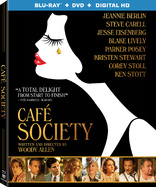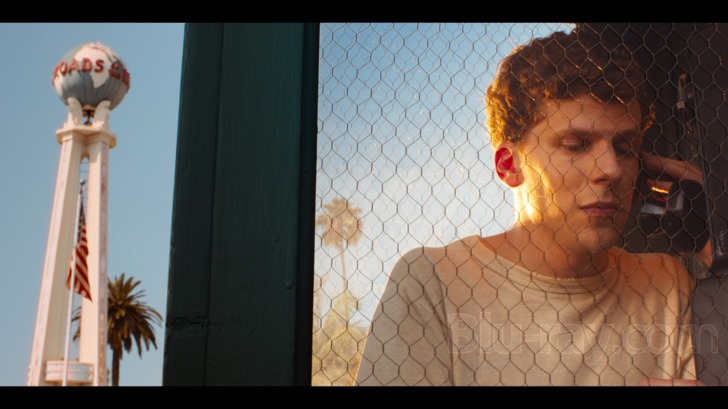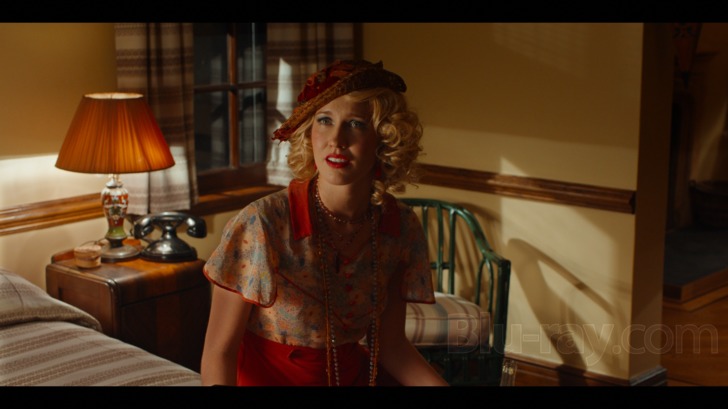Café Society Blu-ray Movie
HomeCafé Society Blu-ray Movie 
Blu-ray + DVD + UV Digital CopyLionsgate Films | 2016 | 96 min | Rated PG-13 | Oct 18, 2016

Movie rating
6.7 | / 10 |
Blu-ray rating
| Users | 4.2 | |
| Reviewer | 3.0 | |
| Overall | 3.0 |
Overview
Café Society (2016)
A young man arrives in Hollywood during the 1930s hoping to work in the film industry. There, he falls in love, and finds himself swept up in the vibrant café society that defined the spirit of the age.
Starring: Jeannie Berlin, Steve Carell, Jesse Eisenberg, Blake Lively, Parker PoseyNarrator: Woody Allen
Director: Woody Allen
| Romance | Uncertain |
| Drama | Uncertain |
| Comedy | Uncertain |
Specifications
Video
Video codec: MPEG-4 AVC
Video resolution: 1080p
Aspect ratio: 2.00:1
Original aspect ratio: 2.00:1
Audio
English: DTS-HD Master Audio 5.1
Subtitles
English, English SDH, Spanish
Discs
Blu-ray Disc
Two-disc set (1 BD, 1 DVD)
UV digital copy
DVD copy
Packaging
Slipcover in original pressing
Playback
Region A (C untested)
Review
Rating summary
| Movie | 3.0 | |
| Video | 5.0 | |
| Audio | 4.0 | |
| Extras | 1.0 | |
| Overall | 3.0 |
Café Society Blu-ray Movie Review
'Manhattan' west.
Reviewed by Jeffrey Kauffman October 17, 2016It’s perhaps unintentionally ironic that Woody Allen’s love letter to 1930s Hollywood, Café Society, is strong on elements like production design and cinematography while tending to wander a bit in the actual story department. Refugees from the Depression who flocked to movie theaters in droves back in the actual 1930s wanted to escape the rigors of their everyday lives, and so more often than not Hollywood films of the era offered glamour galore, if sometimes less than powerful plot dynamics (this is of course a sweeping generalization, so don’t get too offended). Café Society is in some ways Allen’s “prettiest” picture, full of gorgeous honey colored scenes of the Hollywood glitterati attending huge poolside parties, but from a narrative standpoint it, well, just kinds of stands there, waiting for something that never quite arrives, kind of like its focal couple, new Los Angeles transplant Bobby Dorfman (Jesse Eisenberg) and a secretary named Vonnie (Kristen Stewart). The film is narrated by Allen, who helps bridge some story gaps while also giving character summaries for a large cast, some of whom are never really very fully developed or at least exploited very well. Bobby, unwilling to spend his life working in his New York family’s jewelry business, decides to move to Hollywood, where his mother’s brother Phil (Steve Carell) is a big time agent. Phil, who is shown holding court at one of those aforementioned poolside parties early in the film, likes to drop names like Ginger Rogers within earshot of anyone who might be listening, but in Allen’s formulation Phil is surprisingly not a blowhard without real connections. When Bobby’s mother and Phil’s sister Rose (Jeannie Berlin) manages to track him down at the party via that costly service known as long distance telephoning, Phil is a little put off, since it may keep him from accepting a call from Ginger Rogers. Rose asks Phil to help Bobby, and while Phil isn’t overly committal, there’s also not an angry denial of aid. Bobby arrives in Los Angeles, and while it takes him a few days to actually be invited into the inner sanctum of Phil’s Hollywood agency, Bobby is in fact offered a kinda sorta job as an unofficial errand runner for his Uncle. Since he knows no one in the city (or even the city itself), Phil asks his secretary Vonnie to act as the kid’s tour guide. It doesn’t take a rocket scientist (or a graduate from the Syd Field school of screenwriting) to know that some kind of romantic entanglement is going to crop up for Bobby and Vonnie.

Allen seems to want to be revisiting some of the story construction he parlayed so brilliantly in family based films like Radio Days. Allen’s voiceover quickly introduces a gaggle of Dorfman relatives, including Rose of course along with husband and father Marty (Ken Stott), but also Bobby’s sister Evelyn (Sari Lennick), who is married to a communist activist named Leonard (Stephen Kunken). There’s also Bobby’s older brother Ben (Corey Stoll), a ne’er-do-well who is a gangster, but who has the good sense to shower his mother with piles of loot from his ill gotten gains. This slate of introductions never really goes anywhere, though (unlike in Radio Days), with at least some of these characters relegated to extremely brief vignettes, often tied to Bobby’s missives back to them from the sun drenched climes of Hollywood.
Meanwhile a whole slew of other characters is introduced (often without any narrator explaining things) on the west coast, as Bobby starts to work for Phil, rubbing elbows with the Hollywood elite. This include two other New York transplants, Rad (Parker Posey) and Steve (Paul Schneider). Who are these people? You’ll struggle to deign anything from the screenplay, since Allen more or less simply has the two show up, develop an instant rapport with Bobby, and then disappear again, only to reappear at various moments. It’s simply one example of the kind of halting, lurching quality Allen’s writing has in this film, as if he wasn’t quite sure where he wanted the story to go, and simply let some trance based “automatic writing” take hold.
The film is full of peculiar vignettes, even divorced from what turns out to be a fairly traditional Allen-esque love triangle, once it’s revealed that Vonnie is in the throes of an affair with the married Phil, even while Bobby continues to gaze at her with his puppy dog eyes. One of the odder sequences involves Bobby hiring a prostitute (recommended by older brother Ben). That turns out to be a young “first timer” named (or supposedly named) Candy (Anna Camp), who shows up at the flustered Bobby’s apartment late and confused. The scene goes nowhere, with a “will they or won’t they?” approach that one assumes is supposed to be funny and awkward, failing on the first count and succeeding on the second only in terms of how Eisenberg and Camp tend to come off in it.
The unrequited love angle would seem to be perfect for Allen’s particular sensibility, but Café Society never really fully investigates it, ultimately pairing Vonnie with Phil and Bobby with a new main squeeze named Veronica (Blake Lively). The second half of the film actually starts delving more into Ben’s criminal activities and how they impact Bobby, another kind of odd detour in a film already filled with them. As with even the least effective Allen film, there are enjoyable tidbits sprinkled throughout the diffuse story. At least a couple of these actually involve Ben, with Allen delivering nicely staged punchlines regarding Ben’s “negotiating” tactics. But these are brief oases in what is otherwise a kind of surprisingly bland saga, one that almost certainly would not have satisfied weary audiences back in the thirties looking for something to help them forget tawdry private lives such as the ones on display throughout the film.
Note: My colleague Brian Orndorf was apparently even less impressed with the film than I was. You can read Brian's thoughts here.
Café Society Blu-ray Movie, Video Quality 

Café Society is presented on Blu-ray courtesy of Lionsgate Films with an AVC encoded 1080p transfer in 2.00:1. Allen is perhaps grudgingly moving into the 21st century, as evidenced by the fact that this was shot digitally (and also confounds Allen's predilection toward mono soundtracks by offering a full 5.1 mix on this Blu-ray). This is one gorgeous looking transfer, one which actually is surprisingly "filmic" despite the modern technology utilized to capture the imagery. Cinematographer Vittorio Storaro is of course a legend in his field, having lensed such classics as The Bird With the Crystal Plumage, The Conformist, Last Tango in Paris, 1900 , Apocalypse Now and The Last Emperor. Storaro lights things magnificently throughout the picture, and even with some scenes graded (or lit) to a buttery yellow color, detail levels remain uniformly high. Fine details on costumes and other fabrics are virtually tactile at times, and close-ups offer precise looks at elements like facial pores and flyaway hair. Even some dimly lit scenes (including a wonderfully evocative candlelit sequence) don't really suffer much if at all in terms of deficits in shadow definition or general detail levels. Whatever the narrative shortcomings of Café Society, this is one gorgeous film to simply watch.
Café Society Blu-ray Movie, Audio Quality 

Café Society continues the recent trend of Allen's films offering up surround tracks after a long almost insistent bout of mono soundtracks through the years. The film's DTS-HD Master Audio 5.1 has decent if never really overwhelming immersion, much coming courtesy of the enjoyable jazz score. Some of the crowded party scenes create a lifelike atmosphere will both well placed ambient environmental effects as well as nicely directional dialogue (or at least crowd noises). Fidelity is fine throughout the presentation, and there are no problems of any kind to report.
Café Society Blu-ray Movie, Special Features and Extras 

- On the Red Carpet (1080p; 2:13) is a brief compendium of self congratulatory press availabilities (none with Allen, though he's seen).
- Photo Gallery (1080p)
Café Society Blu-ray Movie, Overall Score and Recommendation 

While I frankly didn't care one whit (or at least not many whits) on an emotional level about most of the characters in Café Society, and once it became obvious (due early on courtesy of some pretty forced sounding dialogue) that this wasn't going to be prime Allen, I just kind of relaxed into the vignette driven ambience of the piece, not to mention the sumptuous cinematography of Vittorio Storaro. I was also surprisingly engaged by Kristen Stewart, an actress whose allure has thus far largely escaped me. There may not be a lot of "there" there in Café Society, but what is there is pretty stunning to look at quite a bit of the time. With caveats duly noted, Café Society comes Recommended.
Similar titles
Similar titles you might also like

Camille
Warner Archive Collection
1936

Midnight
1939

Midnight in Paris
2011

The Devil Wears Prada
10th Anniversary Edition
2006

A Little Chaos
2014

Angel
1937

Rules Don't Apply
2016

Magic in the Moonlight
2014

Vicky Cristina Barcelona
2008

Brooklyn
2015

The Secret Life of Walter Mitty
1947

Kitty Foyle
1940

Third Person
2013

The Skeleton Twins
2013

Stand-In
1937

Libeled Lady
Warner Archive Collection
1936

To Rome with Love
2012

Far from the Madding Crowd
2015

Home Again
2017

Irrational Man
2015